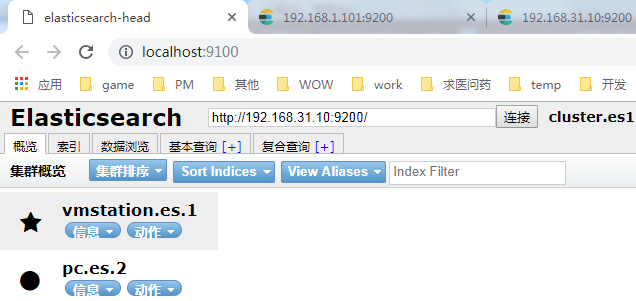Elasticsearch 集群
一、两台机器
centos:192.168.31.10
win7:192.168.1.101
二、配置
# ---------------------------------- Cluster ----------------------------------- # # Use a descriptive name for your cluster: # #cluster.name: my-application #同一个集群设置相同 cluster.name: cluster.es1 # # ------------------------------------ Node ------------------------------------ # # Use a descriptive name for the node: # #node.name: node-1 #每台机器不一样 node.name: pc.es.2 #指定该节点是否有资格被选举成为master节点,默认是true,es是默认集群中的第一台机器为master,如果这台机挂了就会重新选举master node.master: true #允许该节点存储数据(默认开启) node.data: true # # ---------------------------------- Network ----------------------------------- # # Set the bind address to a specific IP (IPv4 or IPv6): # #network.host: 192.168.0.1 network.host: 192.168.1.101 # # Set a custom port for HTTP: # #http.port: 9200 http.port: 9200 # 设置节点间交互的tcp端口,默认是9300 transport.tcp.port: 9300 # # For more information, consult the network module documentation. # # --------------------------------- Discovery ---------------------------------- # # Pass an initial list of hosts to perform discovery when new node is started: # The default list of hosts is ["127.0.0.1", "[::1]"] # #discovery.zen.ping.unicast.hosts: ["host1", "host2"] discovery.zen.ping.unicast.hosts: ["192.168.1.101", "192.168.31.10"] # # Prevent the "split brain" by configuring the majority of nodes (total number of master-eligible nodes / 2 + 1): # #discovery.zen.minimum_master_nodes: #如果没有这种设置,遭受网络故障的集群就有可能将集群分成两个独立的集群 - 分裂的大脑 - 这将导致数据丢失 #如果只有两台服务器,应该设置为1 discovery.zen.minimum_master_nodes: 1 # ---------------------------------- head plugin ----------------------------------- # 增加新的参数,这样head插件可以访问es。设置参数的时候:后面要有空格 http.cors.enabled: true http.cors.allow-origin: "*"
三、测试
运行es后,测试:curl http://192.168.1.101:9200/_cat/health?v
用head插件:

’



 浙公网安备 33010602011771号
浙公网安备 33010602011771号